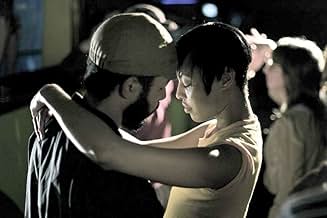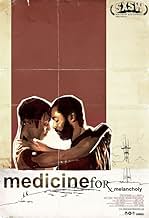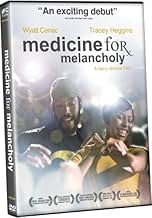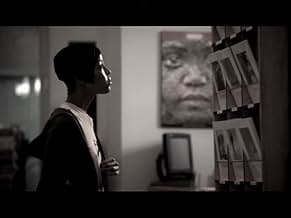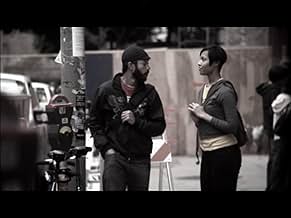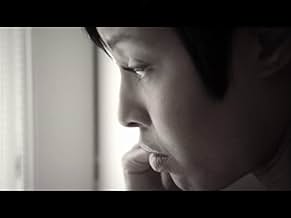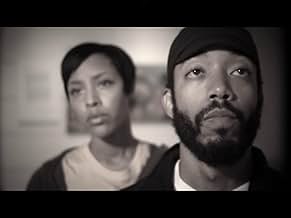AVALIAÇÃO DA IMDb
6,6/10
2,8 mil
SUA AVALIAÇÃO
Adicionar um enredo no seu idiomaTwenty-four hours in the tentative relationship of two young San Franciscans also dealing with the conundrum of being a minority in a rapidly gentrifying city.Twenty-four hours in the tentative relationship of two young San Franciscans also dealing with the conundrum of being a minority in a rapidly gentrifying city.Twenty-four hours in the tentative relationship of two young San Franciscans also dealing with the conundrum of being a minority in a rapidly gentrifying city.
- Prêmios
- 2 vitórias e 10 indicações no total
Melissa Bisagni
- Sierra Orneilias
- (as Melisa Bisagni)
Chida Emeka
- Hydration Hustler 1
- (as Chidi Emeka)
Ondine Kilker
- Ondine Kilcher - Housing Rights Meeting Attendee
- (as Ondine Kilcher)
Avaliações em destaque
Twenty-four hours in the tentative relationship of two young San Franciscans also dealing with the conundrum of being a minority in a rapidly gentrifying city.
Barry Jenkins has described the film's two main characters as "playing out a debate back and forth about identity politics". Each of the two main characters embodies an ideology. Jenkins saw the character of Micah as a man who was always building barriers, whereas Jo thinks that race is a limiter. Accusing Jo of assimilation, Micah strives to reclaim his essential "blackness" as Jo contrastingly claims Micah has a "hang up" about his race and strives to overcome her own.
Roger Ebert gave the film 3.5 out of 4 stars, calling the actors "effortlessly engaging" and the direction "assured"; he also noted the film was "beautifully photographed". Ebert is right on all counts. The acting is superb, very natural, and really shows off Wyatt Cenac as more than a comedian. The direction is strong, and the cinematography is gorgeous, some of the best you will find anywhere, whether in a big budget film or indie.
The discussion of race is great. As a white man, maybe I can't see the issue from the point of view of Micah, Jo or Barry Jenkins. But I love that there's this divide of ideas. Micah is indignant, as he should be, about being a minority. But Jo prefers to look forward. Indeed, how does one define themselves? I don't think of myself as "white", and sometimes not even as a "man", but do these things define me whether or not I choose to accept them?
Barry Jenkins has described the film's two main characters as "playing out a debate back and forth about identity politics". Each of the two main characters embodies an ideology. Jenkins saw the character of Micah as a man who was always building barriers, whereas Jo thinks that race is a limiter. Accusing Jo of assimilation, Micah strives to reclaim his essential "blackness" as Jo contrastingly claims Micah has a "hang up" about his race and strives to overcome her own.
Roger Ebert gave the film 3.5 out of 4 stars, calling the actors "effortlessly engaging" and the direction "assured"; he also noted the film was "beautifully photographed". Ebert is right on all counts. The acting is superb, very natural, and really shows off Wyatt Cenac as more than a comedian. The direction is strong, and the cinematography is gorgeous, some of the best you will find anywhere, whether in a big budget film or indie.
The discussion of race is great. As a white man, maybe I can't see the issue from the point of view of Micah, Jo or Barry Jenkins. But I love that there's this divide of ideas. Micah is indignant, as he should be, about being a minority. But Jo prefers to look forward. Indeed, how does one define themselves? I don't think of myself as "white", and sometimes not even as a "man", but do these things define me whether or not I choose to accept them?
I have no idea what these other reviewers are talking about. Usually these types of glowing reviews are sneaked in by people associated with the film to "prop it up" on the web. This is a painfully slow, bleak looking amateurish "student film" grade bore, topped with an implausible feeling. Forced, pretentious performances especially on the part of the girl played by the amateurish Tracey Heggins. I couldn't keep watching it after the first 10 minutes. I've seen too many of these where you're hoping against all hope that the film will get better - it doesn't 99% of the time so give it up now. I really can't understand what the fuss was about regarding this film on the festival circuit.
The premise of a man and woman rushing through all the phases of falling in love in one twenty-four hour period with the backdrop of a great city is a popular one. Nonetheless, it is a formula I never tire of, especially given the three main characters of "Medicine for Melancholy": Micah, Jo and the city of San Francisco. An awkward introduction in the light of day after a drunken one-night stand leads to an inauspicious "date" spent biking and cabbing around San Francisco. Unlike the relentless (but entertaining) dialogue of the Ethan Hawke and Julie Delpy characters in "Before Sunrise," or the charming tension between the mis-matched and ill-fated Audrey Hepburn and Gregory Peck in "Roman Holiday," the couple in "MFM" spend long moments of non-verbal connecting that is tinged by an overt sadness. This melancholy is confirmed by the sad dog eyes of Micah, the initially cold reaction of Jo and the lovely washed out hues of James Laxton's cinematography as he records the events of the single day shared by the couple. This movie is not driven by a narrative per se but by a series of moments that show a real emotional ballast many cinematic long-term relationships could not convey. Yet, the inevitability of the day's end and thus of the relationship's (mirrored by the fate of the city itself as it succumbs to a gentrified, character-less version of its fabled self), create a longing I felt hours after the movie ended. The soundtrack certainly contributed.
Medicine for Melancholy finds Barry Jenkins in his first feature as writer and director grasping for nothing. I can believe he was working from a script, though the feel and approach is closer to the style by the Duplass brothers and Andrew Bujalski and Joe Swanberg and those loose-as-whatever cats ("Mumblecore" to the critical laymans). What develops here is too little, and as a basic character portrait it falters because the two leads have zero chemistry.
More than that, Wyatt Cenac is both miscast and misdirected; I can believe that he can be funny (at least in a deadpan approach and playing off of someone who can match him) since he was on the Daily Show and other comedy ventures I'd liked, but as the lead in what is ALL about behavior and character and is deep down a drama, he brings less than nothing in this tiny sliver of a slice of life about a guy who tries to connect with a woman he had a one-night stand with (and that she cheated on her boyfriend, who happens to be white, though we never see him, God forbid Jenkins allow some added conflict or emotions to rise)
The two leads need to have enough charisma or chemistry or ANYTHING to keep us engaged, but they're given little by Jenkins (Cenac picks up a a guitar at one point, that's about it, the rest of the time he is either indifferent to Jo, played by Tracey Higgins), and they don't spark at all off of one another. Compared to them, Anakin and Padme are Michael Douglass and Glenn Close in the first act of Fatal Attraction. And it's not that they need to show full on sexual chemistry or anything like that (there is a sex scene but it's shot in all close- ups and done in a tasteful way, which is fine), but something needs to be there, whether it's dialog that can carry them to a place where we understand what draws them together or mutual interests and so on.
We don't get to know much about these two people, aside from the fact that Micah is obsessed with how black people are portrayed in society and are seen in that way (in the moment of the film where things finally come to some climax as she calls him out on it this is a primary issue), and that Jo likes, uh, art, and thinks Bowie and Queen's Under Pressure is better than Ice, Ice, Baby because it's Bowie and Queen (Micah thinks the beat is used better by Vanilla Ice, nevermind that a white guy is using a beat for a lame rap song and the cultural appropriation baggage there). Even in the brief dip into a pop culture talk, the moment where we might see this man and woman not unlike we might be as couples or trying to get to know people, it's awkward and stilted.
So what Jenkins gives his audience is a lot of these characters walking around, talking here and there, having a moment of sex, and mostly her telling him to do things (take a shower, get something to eat, go dance), and then the realization that (gasp) they have nothing in common. There's no insight, no enjoyment being with this couple, regardless of if the futilism Micah's doing is meant to be interesting in and of itself (this is post a break-up I think, it's unclear though, thanks MySpace reference).
When a filmmaker announces him or herself as a major force in modern cinema with one film it's kind of a big deal, and not unlike Damien Chazelle did with Whiplash and then his follow-up La La Land, it's staggering to consider the quantum leap he had from Guy and Madeline on a Park Bench, and the same can be said here for Jenkins from 'Melancholy' to Moonlight. At least Chazelle had the musical sense already down even if the narrative was sloppy; here, it's like a character exercise that was stretched for far too long, and Jenkins and DP James Laxton (who also shot in brilliant strokes Moonlight) give this a look that should be black and white but seems to be more washed-out, like all of the color has been washed and left to dry on a clothes hanger in the backyard. Though Laxton gets some interesting shots, it's unpleasant to look at, and it makes it a tough sit due to the fact that the characters are unpleasant, or at least the reason they stick together is unpleasant.
One full star goes to the use of Tom Waits' 'Lie to Me.'
More than that, Wyatt Cenac is both miscast and misdirected; I can believe that he can be funny (at least in a deadpan approach and playing off of someone who can match him) since he was on the Daily Show and other comedy ventures I'd liked, but as the lead in what is ALL about behavior and character and is deep down a drama, he brings less than nothing in this tiny sliver of a slice of life about a guy who tries to connect with a woman he had a one-night stand with (and that she cheated on her boyfriend, who happens to be white, though we never see him, God forbid Jenkins allow some added conflict or emotions to rise)
The two leads need to have enough charisma or chemistry or ANYTHING to keep us engaged, but they're given little by Jenkins (Cenac picks up a a guitar at one point, that's about it, the rest of the time he is either indifferent to Jo, played by Tracey Higgins), and they don't spark at all off of one another. Compared to them, Anakin and Padme are Michael Douglass and Glenn Close in the first act of Fatal Attraction. And it's not that they need to show full on sexual chemistry or anything like that (there is a sex scene but it's shot in all close- ups and done in a tasteful way, which is fine), but something needs to be there, whether it's dialog that can carry them to a place where we understand what draws them together or mutual interests and so on.
We don't get to know much about these two people, aside from the fact that Micah is obsessed with how black people are portrayed in society and are seen in that way (in the moment of the film where things finally come to some climax as she calls him out on it this is a primary issue), and that Jo likes, uh, art, and thinks Bowie and Queen's Under Pressure is better than Ice, Ice, Baby because it's Bowie and Queen (Micah thinks the beat is used better by Vanilla Ice, nevermind that a white guy is using a beat for a lame rap song and the cultural appropriation baggage there). Even in the brief dip into a pop culture talk, the moment where we might see this man and woman not unlike we might be as couples or trying to get to know people, it's awkward and stilted.
So what Jenkins gives his audience is a lot of these characters walking around, talking here and there, having a moment of sex, and mostly her telling him to do things (take a shower, get something to eat, go dance), and then the realization that (gasp) they have nothing in common. There's no insight, no enjoyment being with this couple, regardless of if the futilism Micah's doing is meant to be interesting in and of itself (this is post a break-up I think, it's unclear though, thanks MySpace reference).
When a filmmaker announces him or herself as a major force in modern cinema with one film it's kind of a big deal, and not unlike Damien Chazelle did with Whiplash and then his follow-up La La Land, it's staggering to consider the quantum leap he had from Guy and Madeline on a Park Bench, and the same can be said here for Jenkins from 'Melancholy' to Moonlight. At least Chazelle had the musical sense already down even if the narrative was sloppy; here, it's like a character exercise that was stretched for far too long, and Jenkins and DP James Laxton (who also shot in brilliant strokes Moonlight) give this a look that should be black and white but seems to be more washed-out, like all of the color has been washed and left to dry on a clothes hanger in the backyard. Though Laxton gets some interesting shots, it's unpleasant to look at, and it makes it a tough sit due to the fact that the characters are unpleasant, or at least the reason they stick together is unpleasant.
One full star goes to the use of Tom Waits' 'Lie to Me.'
10matty03
I wasn't sure what to expect when I sat down to view this film. I knew it had been filmed here in San Francisco and had won some praise. And, I knew it was low-budget/indie.
However, nothing prepared me for the beauty and quiet power of this film. Aside from the painfully beautiful and realistic performances of the two actors and the story of a stretched out one night stand is something that more than a few of us can relate to/with --- what really makes this film stand out for me is the artistic use of editing and cinematography.
The director has created a sharp and tightly made film. Not in color and not in black and white -- the film really sparkles by use of some form of muted visual effect that works on multiple levels considering the story, emotions, actions and lives of the two characters. The editing is perfect -- creating a pace which is both natural and urgent all at once.
I found this film to be close to perfect and elegant.
I suspect we will see a number of indie filmmakers attempt to copy the style of this film.
How refreshing to see a truly original film which never falls back on cliché or indie film tricks.
I also found the use of San Francisco to be quite clever. The city acts as not only a sort of symbol for various aspects of the characters and their relationship but almost as a third character hovering in every single scene.
This is movie not to be missed!
However, nothing prepared me for the beauty and quiet power of this film. Aside from the painfully beautiful and realistic performances of the two actors and the story of a stretched out one night stand is something that more than a few of us can relate to/with --- what really makes this film stand out for me is the artistic use of editing and cinematography.
The director has created a sharp and tightly made film. Not in color and not in black and white -- the film really sparkles by use of some form of muted visual effect that works on multiple levels considering the story, emotions, actions and lives of the two characters. The editing is perfect -- creating a pace which is both natural and urgent all at once.
I found this film to be close to perfect and elegant.
I suspect we will see a number of indie filmmakers attempt to copy the style of this film.
How refreshing to see a truly original film which never falls back on cliché or indie film tricks.
I also found the use of San Francisco to be quite clever. The city acts as not only a sort of symbol for various aspects of the characters and their relationship but almost as a third character hovering in every single scene.
This is movie not to be missed!
Você sabia?
- CuriosidadesMade on a budget of $13,000.
- Cenas durante ou pós-créditosEach song in the soundtrack appears in the credits with a still frame from the part of the movie where it was used.
Principais escolhas
Faça login para avaliar e ver a lista de recomendações personalizadas
- How long is Medicine for Melancholy?Fornecido pela Alexa
Detalhes
- Data de lançamento
- País de origem
- Central de atendimento oficial
- Idioma
- Também conhecido como
- Medicine for Melancholy
- Locações de filme
- Empresas de produção
- Consulte mais créditos da empresa na IMDbPro
Bilheteria
- Orçamento
- US$ 13.000 (estimativa)
- Faturamento bruto nos EUA e Canadá
- US$ 111.551
- Fim de semana de estreia nos EUA e Canadá
- US$ 12.625
- 1 de fev. de 2009
- Faturamento bruto mundial
- US$ 111.551
- Tempo de duração1 hora 28 minutos
- Cor
- Proporção
- 1.78 : 1
Contribua para esta página
Sugerir uma alteração ou adicionar conteúdo ausente

Principal brecha
By what name was Remédio Para Melancolia (2008) officially released in India in English?
Responda




